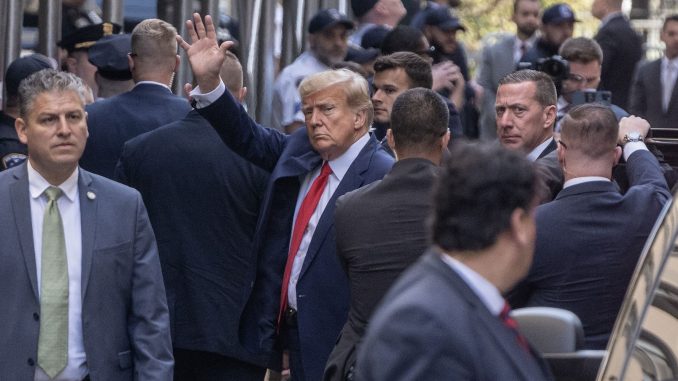
The Roman historian Suetonius described Julius Caesar as timid and noncommittal as he initially approached the Rubicon River—a shallow and narrow waterway that, at the time, demarcated the boundary between Cisalpine Gaul and Italy proper—in January of 49 B.C.
In fact, the historian ultimately attributed Caesar’s decision to cross the waterway, precipitating a four-year civil war and ultimate Caesarian dictatorship, to the supernatural. Prior to crossing, again according to Suetonius, Caesar uttered the now-infamous phrase: “The die has been cast.”
While we cannot know for certain whether New York County, New York, District Attorney Alvin Bragg‘s catastrophic decision to successfully indict and arraign a former president of the United States was partially attributable to an intervening apparition, we can reasonably conclude that the actions of this past week have cast a most woeful die for the trajectory of our decadent, declining republic.
The 34-count formal indictment of former President Donald Trump, laughably meritless on the legal merits and scandalously imprudent on the broader political judgment, represents a genie that cannot, and will not, ever be returned to its bottle.
Much ink has already been spilled on the glaring legal deficiencies in Bragg’s case, which ought to be evident to any competent first-year law student and which had led Bragg’s predecessor, Cyrus Vance Jr., U.S. prosecutors and—in the not-so-distant past—Bragg himself to eschew prosecution.
The underlying New York state crime that Trump allegedly violated and which is the exclusive crime invoked in the formal indictment, falsifying business records in the first degree, has a two-year statute of limitations under New York criminal law. The final alleged criminal bookkeeping action—a “hush money” payment to porn star Stormy Daniels by former Trump “fixer,” and more recently convicted felon, Michael Cohen—was on Dec. 5, 2017. The statute of limitations thus tolled over three years ago.
That alone should suffice to dismiss the case.
Bragg’s theory appears to be that he can somehow evade this, and simultaneously enhance the misdemeanor to a felony, by proving—beyond a reasonable doubt, naturally—that Trump’s bookkeeping falsifications were done in furtherance of another crime. But Bragg, remarkably, has not said what that crime is.
It appears to be some amorphous combination of skirting federal campaign law and/or New York state election law, in the context of Trump’s successful 2016 presidential run. But the former has a five-year statute of limitations (thus also tolled) and is also well outside Bragg’s legitimate prosecutorial jurisdiction as a county district attorney, and the latter should not properly apply to a U.S. presidential candidate.
Moreover, even ignoring the dispositive statute of limitations and jurisdictional issues, the very thing Bragg would need to prove to a jury “beyond a reasonable doubt” to secure the felony enhancement—that Trump directed Cohen to make the payments with the specific intent to benefit his 2016 presidential campaign—is rebutted by Cohen himself, who has testified under oath that Trump requested the payments to be made furtively to spare his family personal embarrassment.
Bragg—lest it go unstated—is the same George Soros-funded “reform prosecutor” who has overseen a 22% year-over-year increase in New York City’s crime rate, even as he has downgraded a whopping 52% of felonies to misdemeanors. In the Big Apple, homicides are spiking, illegal guns are everywhere, single women are afraid to walk the streets of Manhattan alone, and commuters are terrified to ride the subway lest insane homeless persons push them into oncoming trains.
Yet, this is how Bragg—who, along with New York State Attorney General Letitia James, ran on an open and explicit “Get Trump” campaign platform—chooses to spend his time, expend his prosecutorial resources, and seek misdemeanor-to-felony enhancements.
But the deed is done. If not dismissed beforehand, a trial would likely not unfold until later this year or early next. And in the interim, other ambitious prosecutors investigating Trump in Georgia and Washington, D.C., have now watched Bragg shatter the hitherto unbroken precedent of the ruling political party never criminally indicting a former and defeated president of the opposite political party, which had been—until this past week—one of the few remaining things to which we might point to distinguish our late-stage republic from its Third World banana republic equivalents the world over.
Perhaps additional indictments in those jurisdictions will indeed follow. Either way, the political ramifications for the 2024 Republican presidential primary are legion.
With the precedent forever shattered, the onus now falls on the “deplorables” of the American Right to sober up and recognize that the United States is now at the point of no return when it comes to weaponizing governmental powers and partisan prosecutorial apparatuses to reward political friends and punish political enemies within the (sometimes highly debatable, as is the case here) confines of the rule of law.
There is simply no choice but for the Right, and for Republican prosecutors in deep-red jurisdictions across the country, to prudentially and reasonably respond in kind, upping the ante further in the short- to mid-term in an attempt to ultimately deescalate toward a long-term “mutually assured destruction” footing.
Surely there is some creative and ambitious right-wing prosecutor in the Oklahoma Panhandle or West Texas who would like to summon Hunter Biden or Anthony Fauci out to “flyover country,” right?
Sometimes, the only way out is through.
COPYRIGHT 2023 CREATORS.COM
The Daily Signal publishes a variety of perspectives. Nothing written here is to be construed as representing the views of The Heritage Foundation.
Have an opinion about this article? To sound off, please email letters@DailySignal.com and we’ll consider publishing your edited remarks in our regular “We Hear You” feature. Remember to include the url or headline of the article plus your name and town and/or state.

